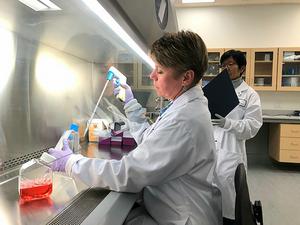
Massachusetts startups raised $10.8 billion across 740 venture capital deals in 2019, according to the latest Venture Monitor report from PitchBook and the National Venture Capital Association.
That dollar amount is down from just a bit from last year: Bay State startups raised $12 billion in 2018, but that was spread across 660 deals—indicating that smaller deals (if you can call some of these deals “small”) are winning the game.
According to PitchBook, these were the top deals in the state last year. (Pitchbook’s methodology includes venture capital investments in angel, seed, early-stage, late-stage and growth equity.)
- Altiostar – $118 million
- Egenesis – $100 million
- Hometap – $100 million
- FORMA Therapeutics – $100 million
- Oncorus – $90 million
- Black Diamond Therapeutics – $85 million
- Gelesis – $85 million
- CallMiner – $75 million
- DraftKings – $75 million
- Cygnal Therapeutics – $65 million
Some of these companies won't be private for long. Black Diamond Therapeutics filed for an IPO last week, and DraftKings announced over the holidays that it planned to go public via a reverse merger.
Meanwhile, 2019's top exits were Acquia’s $1 billion buyout by Austin, Tex.-based firm Vista Equity Partners and Onshape’s $470 million acquisition by PTC—the Boston-based industrial software company’s “biggest acquisition ever,” as its CEO told our sister publication the Boston Business Journal. Both transactions closed on Nov. 1.
Massachusetts has easily maintained its status as the nation’s hub for life sciences. Six of the top 10 deals, per the report, were in biotech.
“I'm surprised at how investor sentiment is still so robust toward anything health care,” said Michael Greeley, co-founder and general partner at Flare Capital, where he focuses on investment in health innovation. “For Boston, it’s a little bit Groundhog’s Day. I think we’re going to have another really strong year in the biotech sector. The funds that I’ve raised are focused on health care technology, or software services in health care, and I think that's going to be absolutely a critical sector for this coming year.”


As bullish as that may sound, Greeley doesn’t think 2020 will see investments quite as large as the ones made in 2019, mostly because this year has set such a high mark. (In terms of fundraising alone, Massachusetts startups raised $6.7 billion in 2019, the second-largest fundraising year for the state since PitchBook began publishing data in 2006.)
There are also reasons to be nervous. Last year, even as the Dow soared, the percentage of listed companies in the U.S. losing money over 12 months came close to 40 percent—the highest level since the late 1990s outside of post-recession periods. President Trump’s trade war with China is “not over yet,” as Newsweek reported Monday. Tech companies are preparing for potential cyberattacks from Iran. And on top of all that, it’s an election year.
Parker McKee, a senior associate at Pillar VC, thinks Boston is poised to enter a “golden age” of growth in spite of these threats, particularly as the tech ecosystem overall begins to mature.
“While the 2010s gave rise to social media and consumer apps—largely centered on the West Coast—the ’20s promise deeper innovations rooted in serious science, where Boston thrives,” McKee said in an email to BostInno.
McKee cited new transportation modes like VTOLS and delivery bots, artificial intelligence and novel bioengineering methodologies as trends to watch in the coming decade.
Still, in Greeley’s eyes, there’s plenty of room for comparison between our present moment and 1999 or 2007—just before the dot-com bubble and the housing bubble burst, respectively. Now, it’s up to investors to decide where they want to put their money in an economy whose stability could be threatened.
“[There will be] a little bit more risk aversion, or sort of a rotation to more mature private companies or companies that have de-risked product and team issues,” Greeley said. “Round sizes will be larger, but overall dollars will be less, because investors will probably move away from the most risky—seed and early-stage—to mid-stage and growth.”
In 2018, venture capital deals surpassed dot-com era levels, and 2019 was not far behind. Nationally, the venture industry put $136.5 million into American companies, exceeding the $130 billion mark for the second consecutive year. And last year set a new annual record for U.S. VC exit value: $256.4 billion across 882 liquidity events, per the report.

It was also a record year for female founders, a group that has historically been shortchanged by the venture capital industry. About $18.3 billion went toward women-founded companies across the U.S., up 8.3 percent over the previous year.
“In 2019, we saw the highest exit value ever tracked, record capital deployed to female-founded startups and the most late-stage deals ever closed, to name a few,” PitchBook founder and CEO John Gabbert said in a statement. “The continued proliferation of nontraditional investors participating in VC and the need for LPs to recycle distributed capital back into new VC funds should keep venture momentum strong heading into 2020.”

Not all venture capitalists use these numbers as markers of success. Richard Dulude, a partner at Underscore VC who independently reviewed the PitchBook data, said in an email to BostInno that fundraising only matters if it leads to a healthy innovation economy—which Boston is.
“At the end of the day, outside of the 'funding mirage' from these mega-rounds, the only thing that really matters is customer adoption that translates into value growth and eventual capital flow back into the ecosystem,” he said. “All noise aside, Boston is consistently a top three geography by exit value as shown by this year's data (and last year's data, and last-last year's data) and will continue to retain that position as a leading technology innovation ecosystem in the world.”








